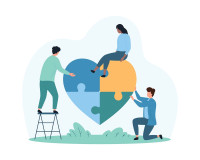Life & Style
Is it easy to forgive?
Forgiveness is an active choice—very intentional and voluntary—that helps release all the negative emotions in our body.
Tashi Gurung
While working as a school counselor, I remember teaching the concept of forgiveness to young students. The students seemed receptive to the lesson given; however, when the situation arose where any of them felt wronged, I noticed a lot of hesitance in forgiving. I would see these young children harboring such strong feelings of anger and rage.
This raised a question: Is it easy to forgive others?
Forgiveness, in basic terms, is to let go of feelings of resentment and anger towards someone for any wrongdoing that they have inflicted upon us. It is an active choice; very intentional and voluntary. And most of all, it helps to release all the negative emotions in our body– especially of revenge.
In theory, it seems like the ideal thing to do for a healthy release of emotions. But in practice, we all know how difficult the path of forgiveness can be. During my high school years, I used to be bullied heavily. The inner rage that I used to hold, though never expressed, never really diminished, even when I was in my early 20s.
I agreed to meet my bullies for a gathering recently. When I showed up, I regretted it instantly. However, a strange thing happened, I saw these people as adults now. Most of them were very different from how I had seen them as a child. Some of them were married and even had children.
And on the way back home, it was the most exhilarating feeling that I had experienced. It seemed like the years of these pent-up feelings were finally out. I had decided to forgive them because, seeing them all grown up, I felt a pang of empathy towards them. I realized they are not any different than I am. In a lot of ways, we are actually the same.
On the other hand, there was no big scene of confrontation. This whole process was just internal, I had made the active choice to forgive. Hence, forgiving them was not accepting what they did was correct nor was it villainising them to the extreme of wanting to hurt them.
While changing perspectives and outlook can make it easier, forgiveness is a very personal journey, and through my experience working as a counselor, I cannot attest to this fact enough. In fact, it can actually be very detrimental to be forced to do so. Considering the context of our societal norms, this is not an uncommon phenomenon. If we are obliged to forgive someone, it denotes insincerity; because we haven’t gone through the whole process.
When we are seething with intense rage, and we feel dismissed; we tend to react even more strongly. Not only do we start to feel that the rage is wrong or unjustified, but our feelings towards the other person start to become even more severe; it might even lead to feelings of hatred, revenge and vengeance.
It is thus very important to go through the whole process of anger and rage. Why? If we do not, no matter how much we try to forgive, it becomes very difficult. Acknowledging that we have been wronged, and feeling angry about it is necessary and can actually be very therapeutic. This is also where a therapist can be very effective in providing insight about the emotions we are feeling.
A therapist can be especially helpful when we have had painful childhood experiences. If we had parents or other primary caretakers who might have been neglecting, dismissive, withdrawing, unreliable or even abusive, forgiveness is going to be very hard. But it is attainable. Gradually, the therapist can access those past memories and experiences, and bring emotional catharsis safely: no matter how difficult it is, those painful emotions should be brought to the surface and be confronted in a safe way.
Going back to my experiences as a school counsellor, I asked the students to stay with with the feeling of anger. Them accepting their feelings of rage was enough for me as a therapist to make them feel empowered to deal with the complex emotions in their head. I started to notice a difference instantly: when we accessed these feelings together—within a span of a couple of sessions, they were able to gain perspective. They would understand rationally, and they were able to let go.
Not just therapists, but having a good support system—friends, family or any person—who listen and accept how we feel can be enough in itself. When our feelings are validated by other people, be it therapists or friends or family; we can respond to it in a healthy manner.
Thus, respecting other people’s negative emotions and acknowledging our own can help to make the process of forgiveness very much easier. Any amount of hurt and pain, no matter how small, may need to be revisited time and again. But doing so would certainly lead to healing. We all have our pathway to tread through the process of forgiveness, and being patient and attuned to it can go a long way.




 9.7°C Kathmandu
9.7°C Kathmandu










